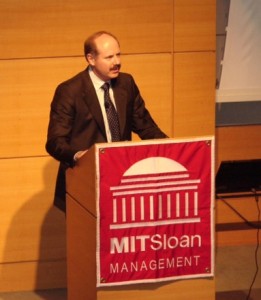A discussion with Top Pharmaceutical Executive Pedro Lichtinger
By Alanna Klapp
Pedro Lichtinger has spent almost four decades in the pharmaceutical industry and is one of the few Hispanic pharmaceutical executives. He served most recently as the president and CEO of Optimer Pharmaceuticals and before that, he was president of Pfizer’s Primary Care Business Unit. He sits on the boards of Biotime, Inc., a public biotech firm based in California with a focus on regenerative medicine, and Sanfer de Mexico, a privately held pharmaceutical research and manufacturing company.
Lichtinger is also a member of the Brazil Foundation, a nongovernmental organization dedicated to promoting equality, social justice, and economic opportunity for all Brazilians. He also serves on the National Board of Governors for the Boys and Girls Club of America, with a goal of helping more Hispanic children graduate college. Lichtinger shares his experience with the Boys and Girls Club, advice to young Hispanics entering the workforce, and strategies that will help firms attract and retain a talented and diverse group of employees, Hispanic or otherwise.
Hispanic Outreach at the Boys and Girls Club of America
The Boys and Girls Club of America serves about 4.1 million children from primary to high school age. The organization provides a caring and fun environment for at-risk children and works to encourage them to attend college. Activities range from basketball to ballet. Lichtinger became involved in 2003 and chairs the Boys and Girls Movement, which focuses on encouraging children of Hispanic origin to join the club.
When the Hispanic outreach began three years ago, there were 700,000 Hispanic kids in the Club. Today, there are about one million. Kids work daily with mentors, do an hour on homework, and enjoy an hour of Internet surfing. They develop skills, perform better in school, and position themselves for success in the corporate world.
Advice to Young Hispanics Looking to Climb the Corporate Ladder to Senior Management
Lichtinger says young Hispanics who want to climb the corporate ladder to senior management positions need to be proud of their entire heritage, Hispanic and American. “We need to move away from having to make a choice.”
He also advises them to seek out mentors, “Mentors are fundamental in the long-term progression of executives in companies. If you work for someone you do not feel is mentoring you, you should look for a different job. You need to look for work or people that are going to make you part of a winning team you truly respect.”
Strategies for Companies Looking to Attract and Retain a Talented and Diverse Group of Employees
“My view is diversity incorporation is a question of corporate culture, and it starts at the very top,” says Lichtinger. Institute practices within the company that address diversity training. Ensure that cultural activities sponsored by the organization are open to everyone, regardless of origin. Train senior executives to recognize the differences in how cultures express leadership, and recognize and acknowledge success. In addition to management, minority groups need to understand and overcome limitations.
“In the end, it’s all about metrics,” says Lichtinger. If a company wants to increase the number of a certain type of candidate, such as women or Hispanics, for all positions at different levels, interviewers need to learn to understand cultural differences. “You can try to level the field, and have a ladder and a career progression based on merit,” he says. Lichtinger cautions the process isn’t easy, “It takes years to implement, and it takes a very strong commitment at the very top of the organization.” In addition, Lichtinger stresses the importance of making different cultures visible and ensuring that the entire company understands the value of diversity. One way to do this is through company sponsored events.
According to Lichtinger, the most important piece of any company’s diversity program is making sure employees feel empowered and recognized for their achievements. A talented, diverse workforce, based on progression through merit, should be one where everyone believes if they do the right thing and perform well, they’ll move up the ladder, regardless of color, religion, or gender. Employees should enjoy what they do in a friendly and fun environment. He says it helps to have a competitive compensation policy, but adds this caveat: “You need a piece of all those factors. It’s not enough to have competitive compensation.” Regardless of cultural origin, employees should be proud of what the company is doing overall, and feel that every morning they’re making a difference in the world.







